Key takeaways:
- Choosing music is a personal journey linked to emotions, moods, and life experiences.
- Understanding your musical taste involves reflecting on memorable experiences, emotional resonance, and exploring new genres.
- Finding new songs can be inspired by live performances, friends’ recommendations, and social media trends.
- Collaborating on playlists fosters connection and creativity, balancing personal preferences with those of others.
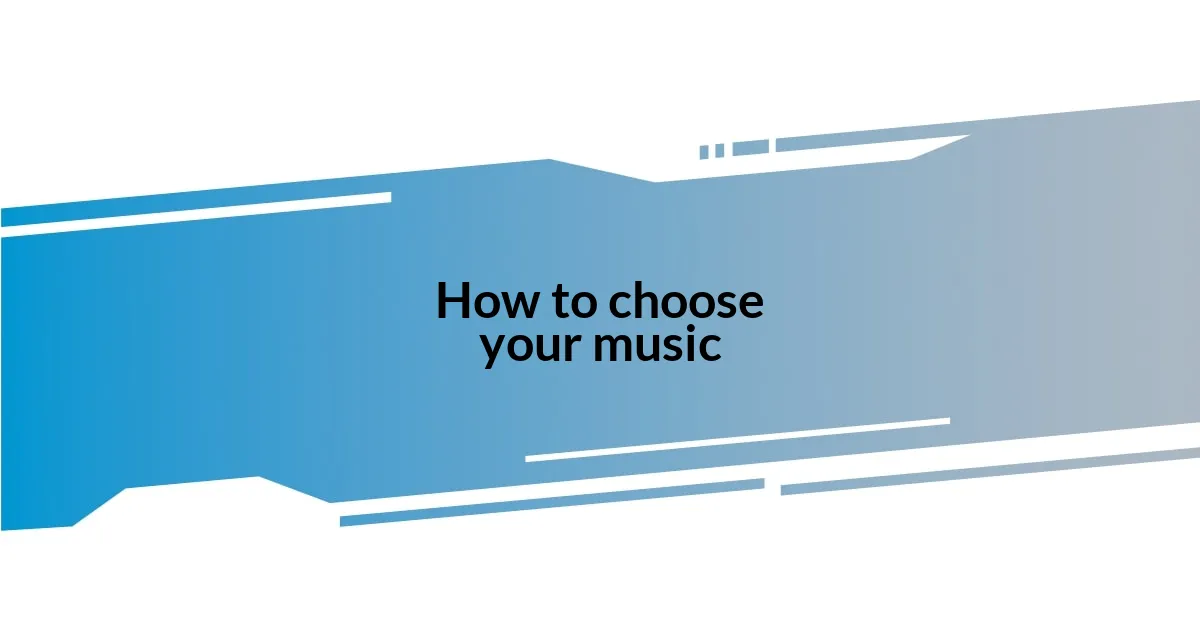
How to choose your music
Choosing your music is often a deeply personal journey. Think about the moments in your life that have been soundtracked by certain songs. For me, the first time I heard “Bohemian Rhapsody,” it wasn’t just a song; it became a reflection of my teenage angst and a symbol of freedom. What songs resonate with your experiences?
Consider your mood and what you’re feeling right now. I’ve found that when I’m feeling reflective, I gravitate towards softer, acoustic melodies, while upbeat pop tunes lift my spirits on challenging days. Ask yourself, what do you need from music—an escape, motivation, or maybe a good cry?
Don’t forget to explore new genres or artists outside your usual playlists. I’ll never forget stumbling upon a jazz track that completely changed my perspective on music. It opened up an entirely new realm of sounds and feelings that I hadn’t considered before. Why not give yourself the freedom to experiment? You never know what might resonate with you!
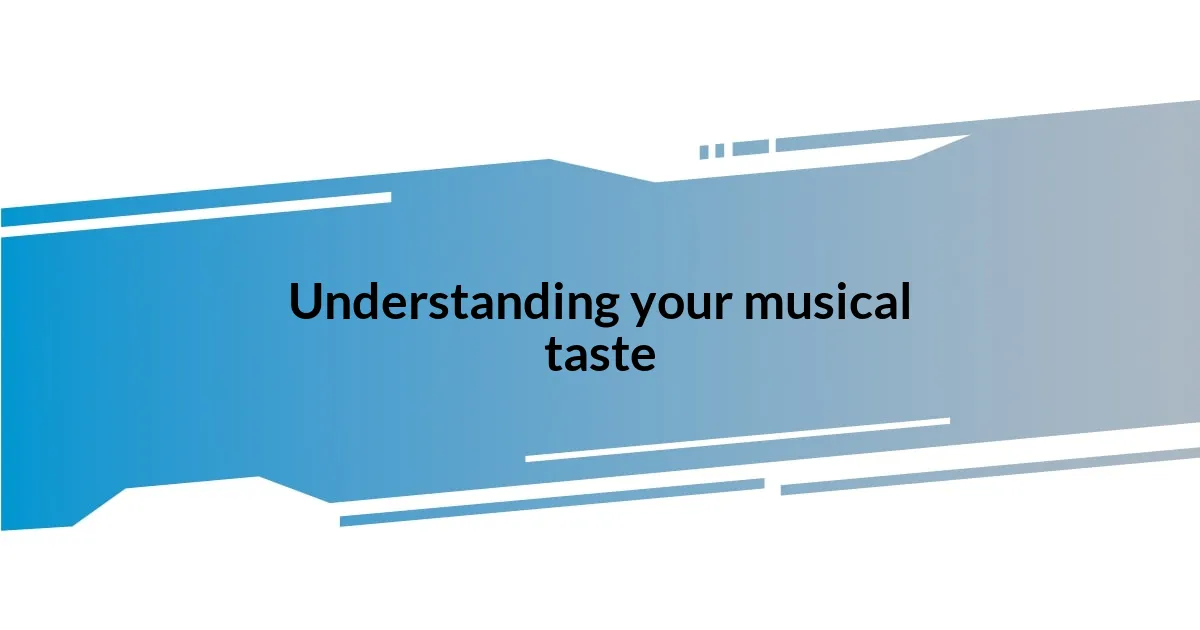
Understanding your musical taste
Understanding your musical taste goes beyond just the sound; it resonates with your emotions and experiences. I remember flipping through my old playlists and realizing how specific songs were tied to particular phases of my life, almost like a musical diary. For instance, during my college years, indie rock dominated my list, reflecting my quest for identity and the thrill of new beginnings. Recognizing these patterns can be a powerful way to connect with your inner self.
To delve deeper into your musical taste, consider these key aspects:
- Memorable Experiences: Reflect on songs linked to pivotal moments, like graduations or breakups.
- Emotional Resonance: Identify tracks that match or shift your mood.
- Genre Exploration: Challenge your existing preferences by discovering new styles or artists.
- Cultural Influence: Think about how your background shapes your musical choices.
- Lyric Connection: Pay attention to lyrics that speak to your personal stories or beliefs.
By exploring these elements, I find it much easier to curate a playlist that feels authentically mine.
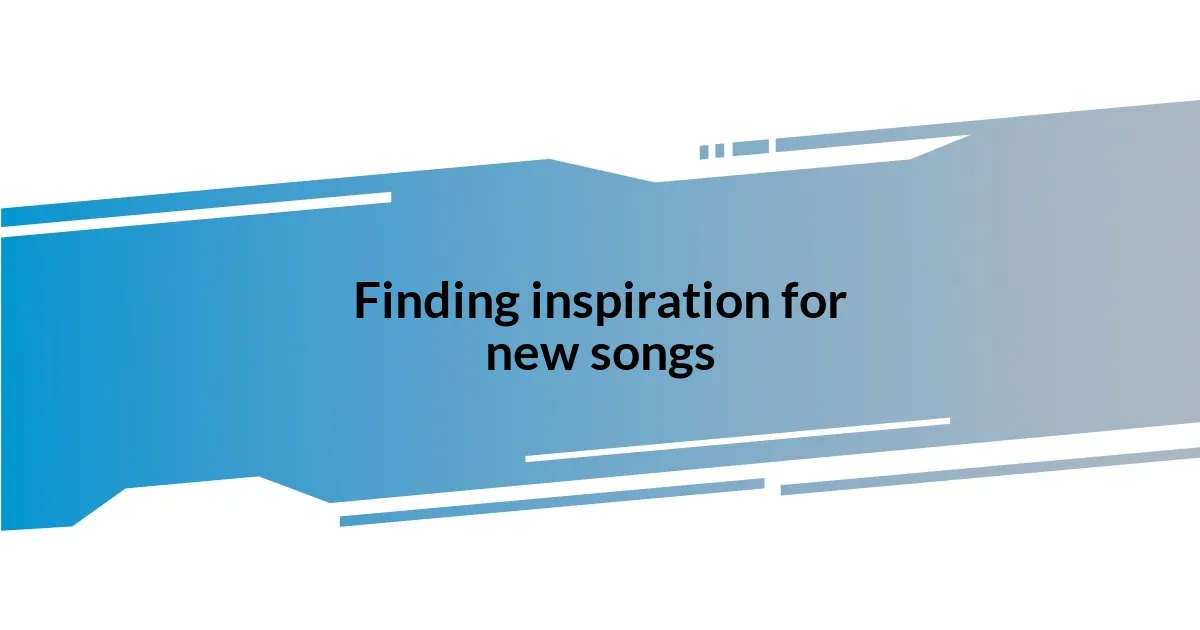
Finding inspiration for new songs
Finding inspiration for new songs can sometimes feel daunting, but I’ve learned to embrace it as part of the playlist curation process. One of my favorite sources is live performances. I remember attending a small concert where the opening act played a captivating song. That moment sparked my curiosity, and I immediately sought out the artist’s full discography. Have you ever had a similar experience where a live rendition made you fall in love with a track? It can lead to a treasure trove of new favorites.
Another great way to discover fresh music is through playlists curated by friends or algorithm-driven recommendations. I often find gems from friends who share their latest finds with me. For example, a colleague once sent me a summer playlist filled with indie tracks, and a particular song resonated so deeply that I played it on repeat for weeks. It’s amazing how others’ perspectives can introduce you to something you might never have stumbled upon alone.
Exploring social media platforms also provides a vibrant avenue for inspiration. I frequently scroll through music discovery hashtags or check out what’s trending on Instagram or TikTok. The viral trends can sometimes feel overwhelming, but they often highlight unique songs that might just fit perfectly into my playlist. Have you explored such platforms? They can be a constant source of musical surprises!
| Source of Inspiration | Personal Experience |
|---|---|
| Live Performances | I discovered an artist at a local concert that changed my musical landscape. |
| Friends’ Recommendations | A friend’s summer playlist introduced me to a song that became my anthem for weeks. |
| Social Media Trends | Scrolling through TikTok led me to unexpected tracks I couldn’t stop playing. |
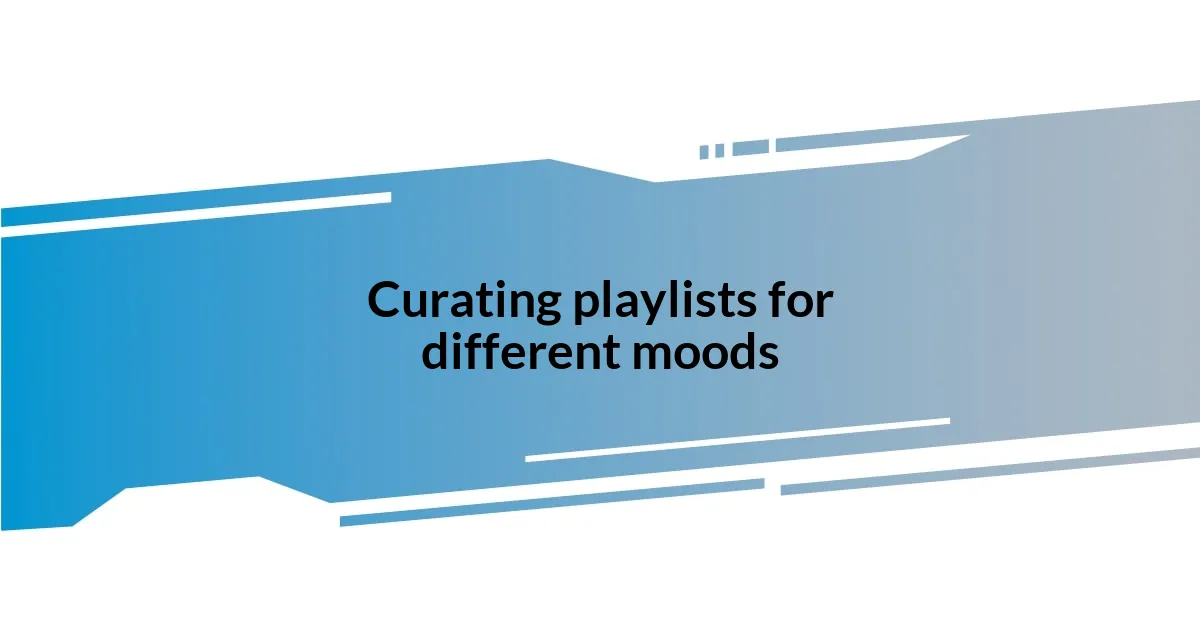
Curating playlists for different moods
Curating playlists for different moods is like crafting a personalized soundtrack for my life. I remember one rainy afternoon when I needed a pick-me-up. I instinctively gravitated toward upbeat pop tracks; their infectious energy lifted my spirits. Have you ever noticed how certain songs can completely change your mood? It’s fascinating how music has the power to shift our emotional landscape.
When I’m feeling reflective, I often turn to mellow acoustic tunes. I distinctively recall a quiet evening spent with a cup of tea, listening to soft melodies that allowed me to process my thoughts. There’s something comforting about that intimacy, don’t you think? It reminds me that we all experience moments when we seek solace in music that mirrors our feelings.
On the flip side, when I’m gearing up for a workout, I love curating high-energy playlists filled with rhythmic beats and motivating lyrics. I vividly remember the adrenaline rush of hitting a personal best while a pump-up anthem blared through my headphones. Isn’t it amazing how a good playlist can transform an ordinary workout into an empowering experience? This contrast in moods shows just how versatile music can be—it speaks to our varying emotional states.
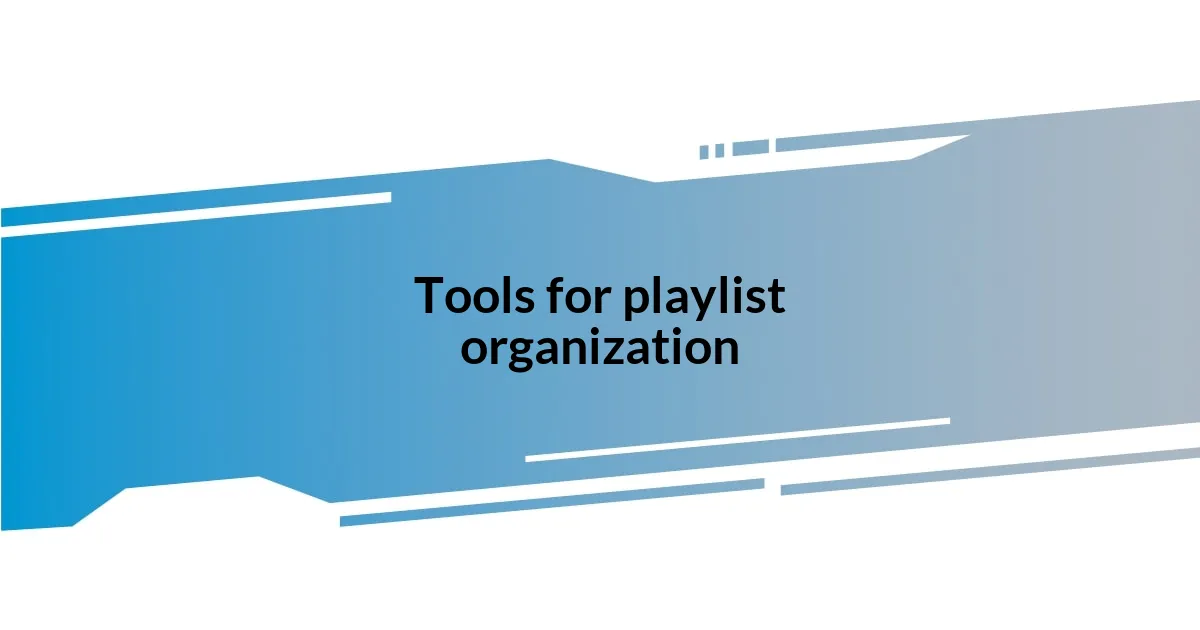
Tools for playlist organization
To keep my playlists organized, I lean heavily on applications designed for this purpose. For instance, I use Spotify to categorize my music by genres, moods, or even specific activities. Have you ever found it frustrating to navigate through a long list of songs? I know I have, which is why having different folders or playlists makes it so much easier to find the right track at the right moment.
Another essential tool I’ve discovered is the tagging feature some music apps offer. By tagging songs with keywords like “feel good” or “chill vibes,” I can quickly filter through my library. I remember one day when I was overwhelmed with choices, and a simple search for “upbeat” led me to a hidden gem I hadn’t listened to in ages. This kind of organizational method not only saves time but also sparks joy when unexpected favorites resurface.
Lastly, sometimes I take it a step further by keeping a physical journal where I jot down my playlist ideas and track recommendations from friends. It’s an old-school method, but I enjoy the creativity it brings. When was the last time you wrote down your thoughts about music? For me, flipping through those pages not only brings back memories but also helps me visualize the emotional journey of my playlists. Each tool, digital or analog, plays a pivotal role in my curation process, allowing me to craft playlists that truly resonate with my experiences and feelings.
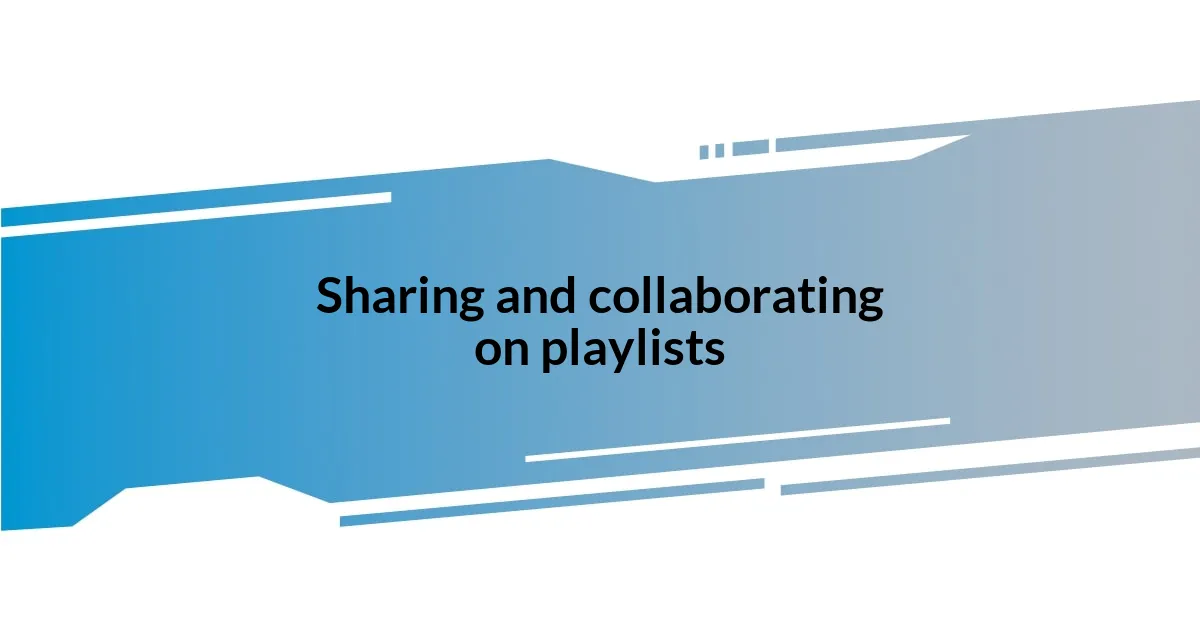
Sharing and collaborating on playlists
Collaborating on playlists can be one of the most rewarding parts of music sharing. Recently, I had the opportunity to create a joint playlist with a close friend, and I found it fascinating how our musical tastes, though different, complemented each other. Have you ever felt that spark of creativity when bouncing ideas off someone? I certainly did as we exchanged tracks that evoked nostalgia, excitement, and even laughter over shared memories.
What I truly enjoy about this collaborative process is the way it brings people closer together. I remember one evening spent curating a “Road Trip” playlist with my siblings. Each person contributed their go-to songs, which created a beautiful tapestry of our collective experiences. It’s a reminder that music has this incredible way of connecting us, bridging gaps and creating shared moments even when we’re miles apart.
Of course, it’s important to balance personal preferences with those of the group. I once had a situation where an intense disagreement arose over song choices—let’s just say one person was all about deep cuts, while another preferred mainstream hits. This taught me the value of compromise. How can we create something meaningful together if we’re not open to different tastes? Ultimately, these shared playlists become a mosaic of our individual styles, celebrating our unique flavors while building a collaborative experience that’s greater than the sum of its parts.